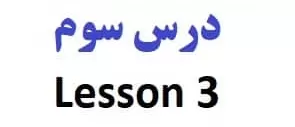
Lesson 3
Helping verbs
Helping verbs have no meaning on their own. They are necessary for the grammatical structure of the sentence, but they do not tell us very much alone. We usually use helping verbs with main verbs. They "help" the main verb. There are only about 15 helping verbs, and we divide them into two basic groups
Primary helping verbs: be, have, do
Modal helping verbs: can, could, may, might, will, would, shall, should, must, ought to
Primary helping verbs
These are the verbs be, do, and have. Note that we can use these three verbs as helping verbs or as main verbs. in this lesson we talk about them as helping verbs. We use them in the following cases:
Modal helping verbs
We use modal helping verbs to "modify" the meaning of the main verb in some way. A modal helping verb expresses necessity or possibility, and changes the main verb in that sense. These are the modal verbs:
can, could
may, might
will, would,
shall, should
must
ought to
Here are examples using modal verbs:
I can't speak Chinese.
John may arrive late.
Would you like a cup of coffee?
You should see a doctor.
I really must go now.
درس سوم
افعال کمکی
افعال کمکی به تنهایی معنای خاصی ندارند. این افعال برای ساختار گرامری جمله نیاز هستند اما اطلاعات زیادی از جمله به ما نمی دهند. ما معمولا از افعال کمکی به همراه افعال اصلی استفاده میکنیم. این افعال به افعال اصلی "کمک" میکنند (همانطور که اسم آنها مشخص است.). در انگلیسی تقریبا" 15 فعل کمکی وجود دارد و ما آنها را به دو گروه تفسیم میکنیم:
افعال کمکی اولیه: be, have, do
افعال کمکی کیفیتی یا چونی: can, could, may, might, will, would, shall, should, must, ought to
افعال کمکی اولیه
افعال کمکی اولیه شامل be, have, do میگردد. باید توجه داشت که این افعال هم افعال کمکی و هم افعال اصلی به حساب می آیند.در این درس از آنها به عنوان افعال کمکی یاد میکنیم. ما از آنها در موارد زیر استفاده میکنیم:
Be: برای ساختن زمانهای استمراری
برای ساختن جملات مجهول
have: برای ساختن زمانهای کامل
do: برای منفی سازی
برای پرسیدن سوال
برای نشان دادن تاکید
برای جانشین فعل اصلی شدن در بعضی جملات
(برای مثالهای مرتبط به بخش انگلیسی در خطوط بالاتر مراجعه فرمایید)
افعال کمکی کیفیتی یا چونی
ما از این افعال برای تعدیل کردن معنی فعل اصلی استفاده میکنیم. افعال کمکی کیفیتی یا چونی بیان کننده ی نیاز یا احتمال میباشند و معنای فعل اصلی را مطابق با آن تغییر میدهند. این افعال افعال کمکی کیفیتی یا چونی میباشند:
Helping verbs
Helping verbs have no meaning on their own. They are necessary for the grammatical structure of the sentence, but they do not tell us very much alone. We usually use helping verbs with main verbs. They "help" the main verb. There are only about 15 helping verbs, and we divide them into two basic groups
Primary helping verbs: be, have, do
Modal helping verbs: can, could, may, might, will, would, shall, should, must, ought to
Primary helping verbs
These are the verbs be, do, and have. Note that we can use these three verbs as helping verbs or as main verbs. in this lesson we talk about them as helping verbs. We use them in the following cases:
-
be
to make continuous tenses (He is watching TV.)
to make the passive (Small fish are eaten by big fish.) -
have
- to make perfect tenses (I have finished my homework.)
-
do
- to make negatives (I do not like you.)
- to ask questions (Do you want some coffee?)
- to show emphasis (I do want you to pass your exam.)
- to stand for a main verb in some constructions (He speaks faster than she does.)
Modal helping verbs
We use modal helping verbs to "modify" the meaning of the main verb in some way. A modal helping verb expresses necessity or possibility, and changes the main verb in that sense. These are the modal verbs:
can, could
may, might
will, would,
shall, should
must
ought to
Here are examples using modal verbs:
I can't speak Chinese.
John may arrive late.
Would you like a cup of coffee?
You should see a doctor.
I really must go now.
درس سوم
افعال کمکی
افعال کمکی به تنهایی معنای خاصی ندارند. این افعال برای ساختار گرامری جمله نیاز هستند اما اطلاعات زیادی از جمله به ما نمی دهند. ما معمولا از افعال کمکی به همراه افعال اصلی استفاده میکنیم. این افعال به افعال اصلی "کمک" میکنند (همانطور که اسم آنها مشخص است.). در انگلیسی تقریبا" 15 فعل کمکی وجود دارد و ما آنها را به دو گروه تفسیم میکنیم:
افعال کمکی اولیه: be, have, do
افعال کمکی کیفیتی یا چونی: can, could, may, might, will, would, shall, should, must, ought to
افعال کمکی اولیه
افعال کمکی اولیه شامل be, have, do میگردد. باید توجه داشت که این افعال هم افعال کمکی و هم افعال اصلی به حساب می آیند.در این درس از آنها به عنوان افعال کمکی یاد میکنیم. ما از آنها در موارد زیر استفاده میکنیم:
Be: برای ساختن زمانهای استمراری
برای ساختن جملات مجهول
have: برای ساختن زمانهای کامل
do: برای منفی سازی
برای پرسیدن سوال
برای نشان دادن تاکید
برای جانشین فعل اصلی شدن در بعضی جملات
(برای مثالهای مرتبط به بخش انگلیسی در خطوط بالاتر مراجعه فرمایید)
افعال کمکی کیفیتی یا چونی
ما از این افعال برای تعدیل کردن معنی فعل اصلی استفاده میکنیم. افعال کمکی کیفیتی یا چونی بیان کننده ی نیاز یا احتمال میباشند و معنای فعل اصلی را مطابق با آن تغییر میدهند. این افعال افعال کمکی کیفیتی یا چونی میباشند:
can, could
may, might
will, would,
shall, should
must
ought to
may, might
will, would,
shall, should
must
ought to

